Lord Surya names (wives and children names) (family information) | What are the (unique) names related to Surya? | What are the names of Surya Putras (sons)? | What is the real name of Surya Dev? | Lord Surya names for baby boy
Namaste friends, how are you doing today? Welcome to #BhagavanBhakthi website / blog.
Bhagavan Lord Sri Krishna (Vishnu) (Rama) and Lord Sri Surya Deva blessings to you and your family!
In this website / blog, you will always learn about #Hinduism #Sanskrit language.
Also subscribe to my YouTube channel from this link #BhagavanBhakthi to view videos about #Hinduism #Sanskrit language.
Just before going to “Lord Surya names (wives and children names) (family information) | What are the (unique) names related to Surya? | What are the names of Surya Putras (sons)? | What is the real name of Surya Dev? | Lord Surya names for baby boy“, let us know a brief, basic and very important information.
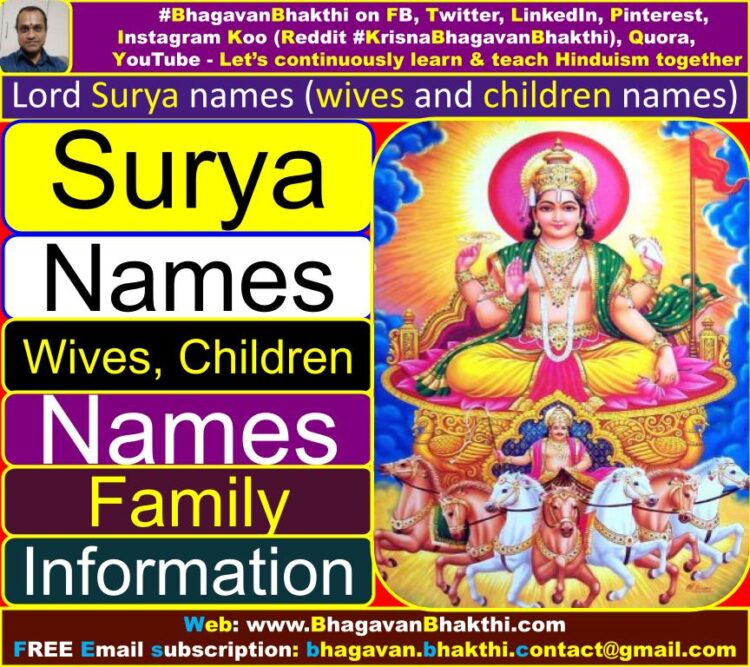
What is the real name of Surya Dev? : Lord Surya Dev real name is Vivasvana (Vivasvan) (विवस्वान) (vivasvāna).
Lord Sri Surya Deva (The Sun God) parents names are Maharishi Kashyapa (father) and Aditi Devi (mother).
Lord Sri Surya Deva (Surya Bhagavan) (The Sun God) is a Devata (Demigod), an Aditya and one among the ‘Nava Graha‘ (nine planets).
Lord Sri Surya Deva’s abode name is called as “Surya Loka” (The Sun planet).
Lord Sri Surya Deva’s different weapons are : Suryastra, Wand, Trisula, Chakra, Gada and Conch Shell.
Lord Sri Surya Deva’s day : Sunday | Bhanuvar (भानुवार) (bhānuvāra) | Ravivar (रविवार) (ravivāra) | Bhaskaravar (भास्करवार) (bhāskaravāra) | etc. |
Lord Sri Surya Deva’s charioteer name : Arun (Aruna) (अरुण) (aruṇa). This chariot will be having seven horses.
Lord Sri Brahma Deva (Brahma Purana), once recounted to the Rishis (Sages) the one hundred and eight sacred names (Ashtottara Shatanamavali) of Lord Sri Surya Deva (The Sun God).
(Note : Below Lord Surya names are given in three formats – First is English script, second in Sanskrit script and third in English-Sanskrit script for better and easy understanding.)
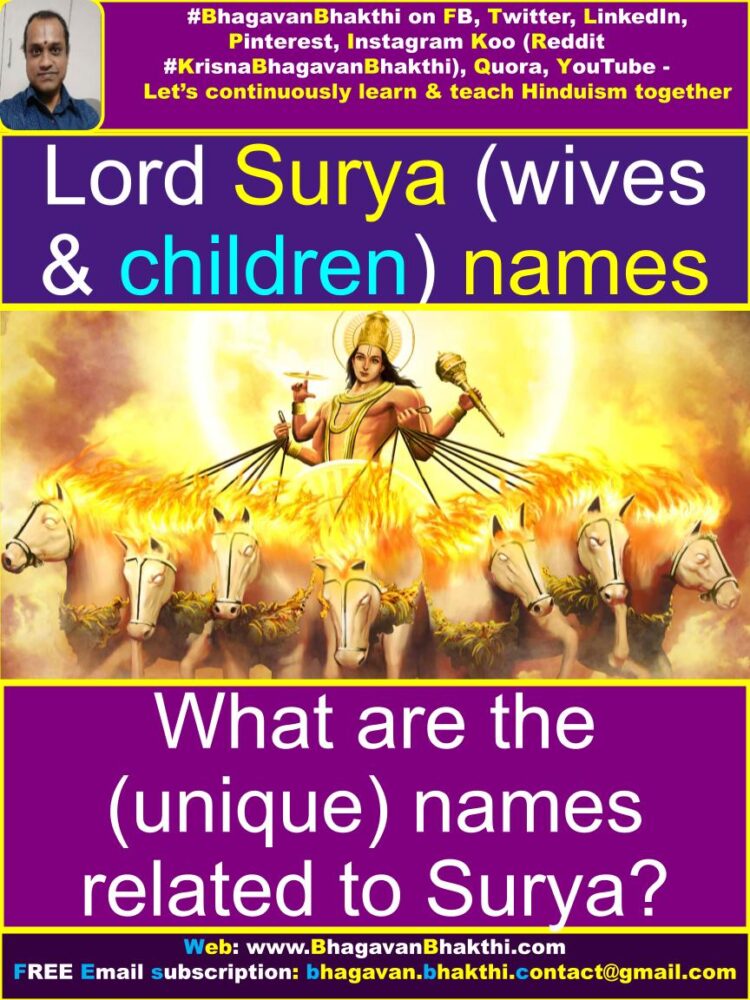
Lord Surya names is as given below (What are the (unique) names related to Surya?) (Lord Surya names for baby boy):
Aruna : Om Arunaya Namaha | ओं अरुणाय नमः | ōṁ aruṇāya namaḥ |
Sharanya : Om Sharanyaya Namah | ओं शरण्याय नमः | ōṁ śaraṇyāya namaḥ |
Karunarasindhu : Om Karunarasindhave Namah | ओं करुणारससिन्धवे नमः | ōṁ karuṇārasasindhavē namaḥ |
Asamanabala : Om Asamanabalaya Namah | ओं असमानबलाय नमः | ōṁ asamānabalāya namaḥ |
Artarakshaka : Om Artarakshakaya Namah | ओं आर्तरक्षकाय नमः | ōṁ ārtarakṣakāya namaḥ |
Aditya : Om Adityaya Namah | ओं आदित्याय नमः | ōṁ ādityāya namaḥ |
Adibhuta : Om Adibhutaya Namah | ओं आदिभूताय नमः | ōṁ ādibhūtāya namaḥ |
Akhilagamavedina : Om Akhilagamavedine Namah | ओं अखिलागमवेदिने नमः | ōṁ akhilāgamavēdinē namaḥ |
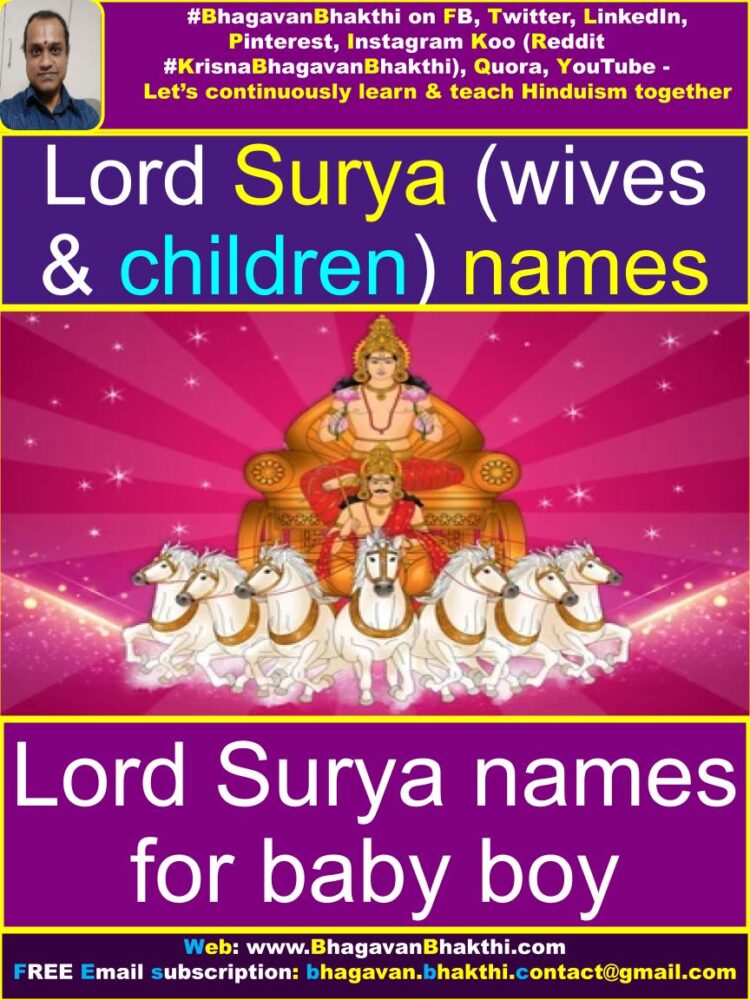
Achyuta : Om Achyutaya Namah | ओं अच्युताय नमः | ōṁ acyutāya namaḥ |
Akhiljna : Om Akhiljnaya Namah | ओं अखिलज्ञाय नमः | ōṁ akhilajñāya namaḥ |
Ananta : Om Anantaya Namah | ओं अनन्ताय नमः | ōṁ anantāya namaḥ |
Ina : Om Inaya Namah | ओं इनाय नमः | ōṁ ināya namaḥ |
Visvaroopa : Om Vishvaroopaaya Namah | ओं विश्वरूपाय नमः | ōṁ viśvarūpāya namaḥ |
Ijya : Om Ijyaya Namah | ओं इज्याय नमः | ōṁ ijyāya namaḥ |
Indra : Om Indraya Namah | ओं इन्द्राय नमः | ōṁ indrāya namaḥ |
Bhana : Om Bhanave Namah | ओं भानवे नमः | ōṁ bhānavē namaḥ |
Indiramandirapta : Om Indiramandiraptaya Namah | ओं इन्दिरामन्दिराप्ताय नमः | ōṁ indirāmandirāptāya namaḥ |
Vandaniya : Om Vandaniyaya Namah | ओं वन्दनीयाय नमः | ōṁ vandanīyāya namaḥ |
Ishaa : Om Ishaaya Namah | ओं ईशाय नमः | ōṁ īśāya namaḥ |
Suprasanna : Om Suprasannaya Namah | ओं सुप्रसन्नाय नमः | ōṁ suprasannāya namaḥ |
Sushila : Om Sushilaya Namah | ओं सुशीलाय नमः | ōṁ suśīlāya namaḥ |
Suvarchasa : Om Suvarchase Namah | ओं सुवर्चसे नमः | ōṁ suvarcasē namaḥ |
Vasuprada : Om Vasupradaya Namah | ओं वसुप्रदाय नमः | ōṁ vasupradāya namaḥ |
Vasava : Om Vasave Namah | ओं वसवे नमः | ōṁ vasavē namaḥ |
Vasudeva : Om Vasudevaya Namah | ओं वासुदेवाय नमः | ōṁ vāsudēvāya namaḥ |
Ujjvalaa : Om Ujjvalaaya Namah | ओं उज्ज्वलाय नमः | ōṁ ujjvalāya namaḥ |
Ugrarupa : Om Ugrarupaya Namah | ओं उग्ररूपाय नमः | ōṁ ugrarūpāya namaḥ |
Urdhvaga : Om Urdhvagaya Namah | ओं ऊर्ध्वगाय नमः | ōṁ ūrdhvagāya namaḥ |
Vivasvata : Om Vivasvate Namah | ओं विवस्वते नमः | ōṁ vivasvatē namaḥ |
Udyatkiranajala : Om | Udyatkiranajalaya Namah | ओं उद्यत्किरणजालाय नमः | ōṁ udyatkiraṇajālāya namaḥ |
Hrishikesha : Om Hrishikeshaya Namah | ओं हृषीकेशाय नमः | ōṁ hr̥ṣīkēśāya namaḥ |
Urjasvala : Om | Urjasvalaya Namah | ओं ऊर्जस्वलाय नमः | ōṁ ūrjasvalāya namaḥ |
Veeraa : Om Veeraaya Namah | ओं वीराय नमः | ōṁ vīrāya namaḥ |
Nirjara : Om Nirjaraya Namah | ओं निर्जराय नमः | ōṁ nirjarāya namaḥ |
Jaya : Om Jayaya Namah | ओं जयाय नमः | ōṁ jayāya namaḥ |
Urudvaya Bhavarupayuktasaratha : Om Urudvaya bhavarupayuktasarathye | ओं ऊरुद्वया भावरूपयुक्तसारथये नमः | ōṁ ūrudvayā bhāvarūpayuktasārathayē namaḥ |
Rishivandya : Om Rishivandyaya Namah | ओं ऋषिवन्द्याय नमः | ōṁ r̥ṣivandyāya namaḥ |
Rugghantra : Om Rugghantre Namah | ओं रुग्घन्त्रे नमः | ōṁ rugghantrē namaḥ |
Rikshachakrachara : Om Rikshachakracharaya Namah | ओं ऋक्षचक्रचराय नमः | ōṁ r̥kṣacakracarāya namaḥ |
Rijusvabhavachitta : Om Rijusvabhavachittaya Namah | ओं ऋजुस्वभावचित्ताय नमः | ōṁ r̥jusvabhāvacittāya namaḥ |
Nityastutya : Om Nityastutyaya Namah | ओं नित्यस्तुत्याय नमः | ōṁ nityastutyāya namaḥ |
Rikaramatrikavarnarupa : Om Rikaramatrikavarnarupaya namaḥ | ओं ॠकारमातृकावर्णरूपाय नमः | ōṁ r̥̄kāramātr̥kāvarṇarūpāya namaḥ |
Ujjwalatejasa : Om Ujjwalatejase Namah | ओं उज्ज्वलतेजसे नमः | ōṁ ujjvalatējasē namaḥ |
Rikshadhinathamitra : Om Rikshadhinathamitraya Namah | ओं ॠक्षाधिनाथमित्राय नमः | ōṁ r̥̄kṣādhināthamitrāya namaḥ |
Pushkaraksha : Om Pushkarakshaya Namah | ओं पुष्कराक्षाय नमः | ōṁ puṣkarākṣāya namaḥ |
Luptadanta : Om Luptadantaya Namah | ओं लुप्तदन्ताय नमः | ōṁ luptadantāya namaḥ |
Shanta : Om Shantaya Namah | ओं शान्ताय नमः | ōṁ śāntāya namaḥ |
Kantida : Om Kantidaya Namah | ओं कान्तिदाय नमः | ōṁ kāntidāya namaḥ |
Ghana : Om Ghanaya Namah | ओं घनाय नमः | ōṁ ghanāya namaḥ |
Kanatkanaka Bhusha : Om Kanatkanaka bhushaya Namah | ओं कनत्कनक भूषाय नमः | ōṁ kanatkanaka bhūṣāya namaḥ |
Khadyota : Om Khadyotaya Namah | ओं खद्योताय नमः | ōṁ khadyōtāya namaḥ |
Lunitakhila daitya : Om Lunitakhila daityaya Namaha | ओं लूनिताखिल दैत्याय नमः | ōṁ lūnitākhila daityāya namaḥ |
Satyananda svarupina : Om Satyananda svarupine Namaha | ओं सत्यानन्दस्वरूपिणे नमः | ōṁ satyānandasvarūpiṇē namaḥ |
Apavargaprada : Om Apavargapradaya Namah | ओं अपवर्गप्रदाय नमः | ōṁ apavargapradāya namaḥ |
Artasharanya : Om Artasharanyaya Namah | ओं आर्तशरण्याय नमः | ōṁ ārtaśaraṇyāya namaḥ |
Ekaki : Om Ekakine Namah | ओं एकाकिने नमः | ōṁ ēkākinē namaḥ |
Bhagavata : Om Bhagavate Namah | ओं भगवते नमः | ōṁ bhagavatē namaḥ |
Shrishtisthityantakari : Om Shrishtisthityantakarine Namah | ओं सृष्टिस्थित्यन्तकारिणे नमः | ōṁ sr̥ṣṭisthityantakāriṇē namaḥ |
Gunatmana : Om Gunatmane Namah ओं गुणात्मने नमः | ओं गुणात्मने नमः | ōṁ guṇātmanē namaḥ |
Ghrinibhruta : Om Ghrinibhrute Namah | ओं घृणिभृते नमः | ōṁ ghr̥ṇibhr̥tē namaḥ |
Briha : Om Brihate Namah | ओं बृहते नमः | ōṁ br̥hatē namaḥ |
Brahma : Om Brahmane Namah | ओं ब्रह्मणे नमः | ōṁ brahmaṇē namaḥ |
Aishwaryada : Om Aishwaryadaya Namah | ओं ऐश्वर्यदाय नमः | ōṁ aiśvaryadāya namaḥ |
Sharva : Om Sharvaya Namah | ओं शर्वाय नमः | ōṁ śarvāya namaḥ |
Haridashwa : Om Haridashwaya Namah | ओं हरिदश्वाय नमः | ōṁ haridaśvāya namaḥ |
Shaura : Om Shauraye Namah | ओं शौरये नमः | ōṁ śaurayē namaḥ |
Dashadiksamprakasha : Om Dashadiksamprakashaya Namah | ओं दशदिक्सम्प्रकाशाय नमः | ōṁ daśadiksamprakāśāya namaḥ |
Bhaktavashya : Om Bhaktavashyaya Namah | ओं भक्तवश्याय नमः | ōṁ bhaktavaśyāya namaḥ |
Ojaskara : Om Ojaskaraya Namah | ओं ओजस्कराय नमः | ōṁ ōjaskarāya namaḥ |
Jaya : Om Jayine Namah | ओं जयिने नमः | ōṁ jayinē namaḥ |
Jagadanandaheta : Om Jagadanandahetave Namah | ओं जगदानन्दहेतवे नमः | ōṁ jagadānandahētavē namaḥ |
Janmamrityujaravyadhi varjita : Om Janmamrityujaravyadhi varjitaya Namah | ओं जन्ममृत्युजराव्याधि वर्जिताय नमः | ōṁ janmamr̥tyujarāvyādhi varjitāya namaḥ |
Aucchasthana samarudharathastha : Om Aucchasthana samarudharathasthaya Namah | ओं औच्चस्थान समारूढरथस्थाय नमः | ōṁ auccasthāna samārūḍharathasthāya namaḥ |
Asurara : Om Asuraraya Namah | ओं असुरारये नमः | ōṁ asurārayē namaḥ |
Kamaniyakara : Om Kamaniyakaraya Namah | ओं कमनीयकराय नमः | ōṁ kamanīyakarāya namaḥ |
Abjavallabha : Om Abjavallabhaya Namah | ओं अब्जवल्लभाय नमः | ōṁ abjavallabhāya namaḥ |
Antarbahih prakasha : Om Antarbahih prakashaya Namah | ओं अन्तर्बहिः प्रकाशाय नमः | ōṁ antarbahiḥ prakāśāya namaḥ |
Achintya : Om Achintyaya Namah | ओं अचिन्त्याय नमः | ōṁ acintyāya namaḥ |
Atmarupa : Om Atmarupine Namah | ओं आत्मरूपिणे नमः | ōṁ ātmarūpiṇē namaḥ |
Achyuta : Om Achyutaya Namah | ओं अच्युताय नमः | ōṁ acyutāya namaḥ |
Amaresha : Om Amareshaya Namah | ओं अमरेशाय नमः | ōṁ amarēśāya namaḥ |
Parasmai jyotisha : Om Parasmai jyotishe Namah | ओं परस्मै ज्योतिषे नमः | ōṁ parasmai jyōtiṣē namaḥ |
Ahaskara : Om Ahaskaraya Namah | ओं अहस्कराय नमः | ōṁ ahaskarāya namaḥ |
Rava : Om Ravaye Namah | ओं रवये नमः | ōṁ ravayē namaḥ |
Hari : Om Hariye Namah | ओं हरये नमः | ōṁ harayē namaḥ |
Paramatma : Om Paramatmane Namah | ओं परमात्मने नमः | ōṁ paramātmanē namaḥ |
Tarunaa : Om Tarunaaya Namah | ओं तरुणाय नमः | ōṁ taruṇāya namaḥ |
Varenyaa : Om Varenyaaya Namah | ओं वरेण्याय नमः | ōṁ varēṇyāya namaḥ |
Grahanampata : Om Grahanampataye Namah | ओं ग्रहाणाम्पतये नमः | ōṁ grahāṇāmpatayē namaḥ |
Bhaskara : Om Bhaskaraya Namah | ओं भास्कराय नमः | ōṁ bhāskarāya namaḥ |
Adimadhyanta Rahita : Om Adimadhyanta rahitaya Namah | ओं आदिमध्यान्त रहिताय नमः | ōṁ ādimadhyānta rahitāya namaḥ |
Saukhyaprada : Om Saukhyapradaya Namah | ओं सौख्यप्रदाय नमः | ōṁ saukhyapradāya namaḥ |
Sakalajagatampata : Om Sakalajagatampataye Namah | ओं सकलजगताम्पतये नमः | ōṁ sakalajagatāmpatayē namaḥ |
Surya : Om Suryaya Namah | ओं सूर्याय नमः | ōṁ sūryāya namaḥ |
Kavaya : Om Kavaye Namah | ओं कवये नमः | ōṁ kavayē namaḥ |
Narayana : Om Narayanaya Namah | ओं नारायणाय नमः | ōṁ nārāyaṇāya namaḥ |
Paresha : Om Pareshaya Namah | ओं परेशाय नमः | ōṁ parēśāya namaḥ |
Tejorupa : Om Tejorupaya Namah | ओं तेजोरूपाय नमः | ōṁ tējōrūpāya namaḥ |
Śrīm Hiranyagarbha : Om Śrīm Hiranyagarbhaya Namah | ओं श्रीं हिरण्यगर्भाय नमः | ōṁ śrīṁ hiraṇyagarbhāya namaḥ |
Hriṁ Sampatkara : Om Hriṁ Sampatkaraya Namah | ओं ह्रीं सम्पत्कराय नमः | ōṁ hrīṁ sampatkarāya namaḥ |
Aim Ishtarthada : Om Aim Ishtarthadaya Namah | ओं ऐं इष्टार्थदाय नमः | ōṁ aiṁ iṣṭārthadāya namaḥ |
Anuprasanna : Om Anuprasannaya Namah | ओं अनुप्रसन्नाय नमः | ōṁ anuprasannāya namaḥ |
Srima : Om Srimate Namah | ओं श्रीमते नमः | ōṁ śrīmatē namaḥ |
Shreyasa : Om Shreyase Namah | ओं श्रेयसे नमः | ōṁ śrēyasē namaḥ |
Bhaktakoti soukhyapradayi : Om Bhaktakoti soukhyapradayine Namah | ओं भक्तकोटि सौख्यप्रदायिने नमः | ōṁ bhaktakōṭi saukhyapradāyinē namaḥ |
Nikhilagamavedya : Om Nikhilagamavedyaya Namah | ओं निखिलागमवेद्याय नमः | ōṁ nikhilāgamavēdyāya namaḥ |
Nityananda : Om Nityanandaya Namah | ओं नित्यानन्दाय नमः | ōṁ nityānandāya namaḥ |
Sri Surya Narayana : Om Sri Surya Narayanaya Namah | ओं श्री सूर्य नारायणाय नमः | ōṁ śrī sūrya nārāyaṇāya namaḥ |
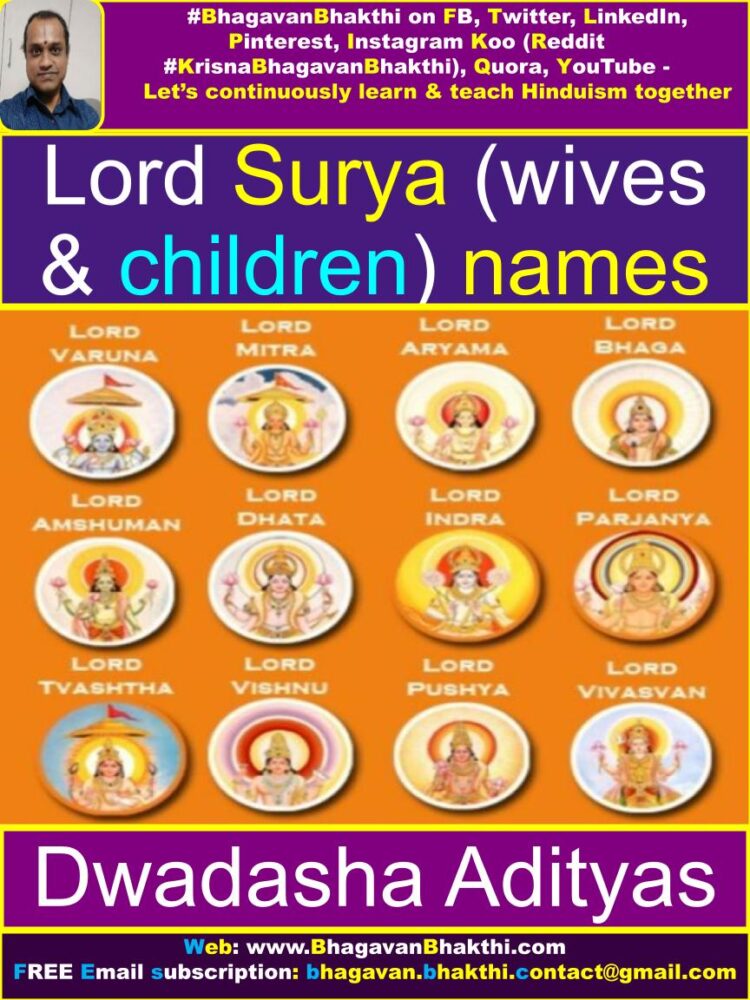
About Dwadasha (twelve) Adityas : The Dwadasha (twelve) Adityas are nothing but different forms of Lord Sri Surya Deva (The Sun God) (Bhagavan Surya).
Dwadasha (twelve) Adityas names are : Indra, Dhata, Parjanya, Tvashta, Pusha, Aryama, Bhaga, Vivasvana, Vishnu (not Lord Sri Vishnu), Amashumana, Varuna and Mitra.
As Indra, Lord Sri Surya Deva (The Sun God) destroys enemies of the Devatas (Demigods).
As Dhata, Lord Sri Surya Deva (The Sun God) grows the living beings.
As Parjanya, Lord Sri Surya Deva (The Sun God) showers down rain.
As Tvashta, Lord Sri Surya Deva (The Sun God) lives in the trees and herbs.
As Pusha, Lord Sri Surya Deva (The Sun God) makes cereals to grow.
As Aryama, Lord Sri Surya Deva (The Sun God) is in the wind.
As Bhaga, Lord Sri Surya Deva (The Sun God) is in the body of all living beings.
As Vivasvana, Lord Sri Surya Deva (The Sun God) is in agni (fire) and helps to cook food.
As Vishnu, Lord Sri Surya Deva (The Sun God) makes shatru nashanam (destroying the enemies) of the Devatas (Demigods).
As Amshumana, Lord Sri Surya Deva (The Sun God) is again in the vayu (air).
As Varuna, Lord Sri Surya Deva (The Sun God) is in the jalam (water) and
As Mitra, Lord Sri Surya Deva (The Sun God) is in the soma (moon) and in the samudram (ocean).
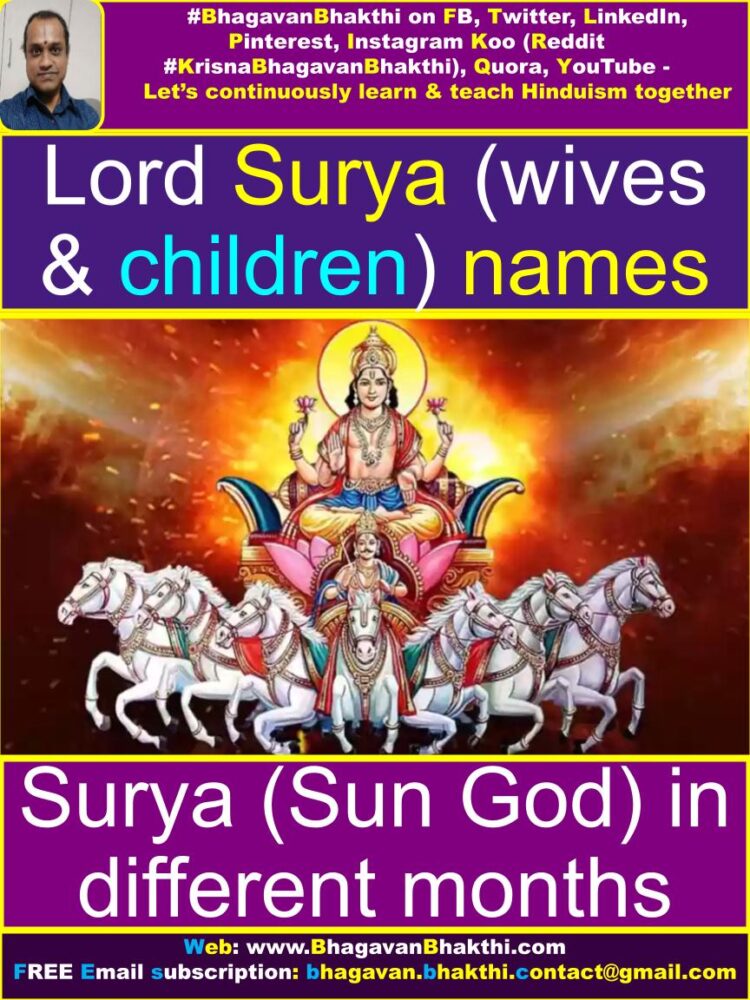
In each month of the year, it is a different Aditya (Lord Surya) (Sun God) who shines as given below (Surya (Sun God) in different months):
Indra shines in the month of Ashvina or Ashvayuja. | Dhata shines in the month of Kartika. | Parjanya shines in the month of Shravana. |
Tvashta shines in the month of Phalguna. | Pusha shines in the month of Pousha. | Aryama shines in the month of Vaishakha. |
Bhaga shines in the month of Magha. | Vivasvana shines in the month of Jyeshtha. | Vishnu shines in the month of Chaitra. |
Amshumana shines in the month of Ashada. | Varuna shines in the month of Bhadra and | Mitra shines in the month of Agrahayana. |
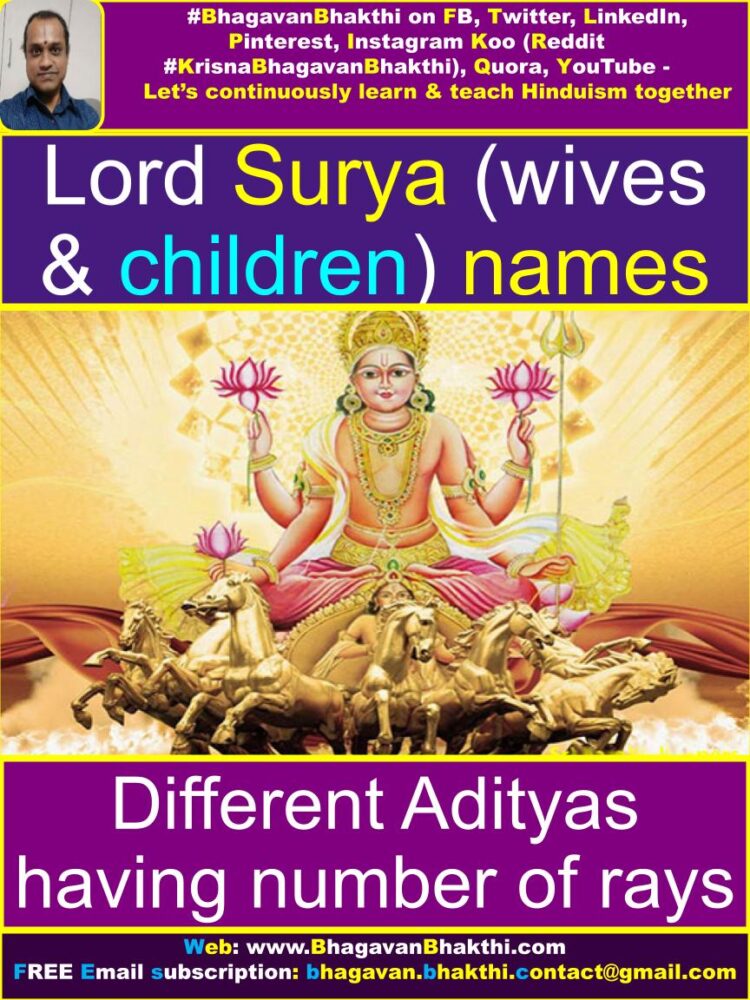
Information about different Adityas having number of rays is as given below:
Vishnu has twelve hundred rays. | Aryama has one thousand and three hundred rays. | Vivasvana has seventy-two rays. |
Amshumana has fifteen rays. | Parjanya has seventy-two rays. | Varuna has one thousand and three hundred rays. |
Tvashta has one thousand and one hundred rays. | Indra has two thousand and two hundred rays. | Dhata has eleven hundred rays. |
Mitra has one thousand rays, and | Pusha has nine hundred rays. |
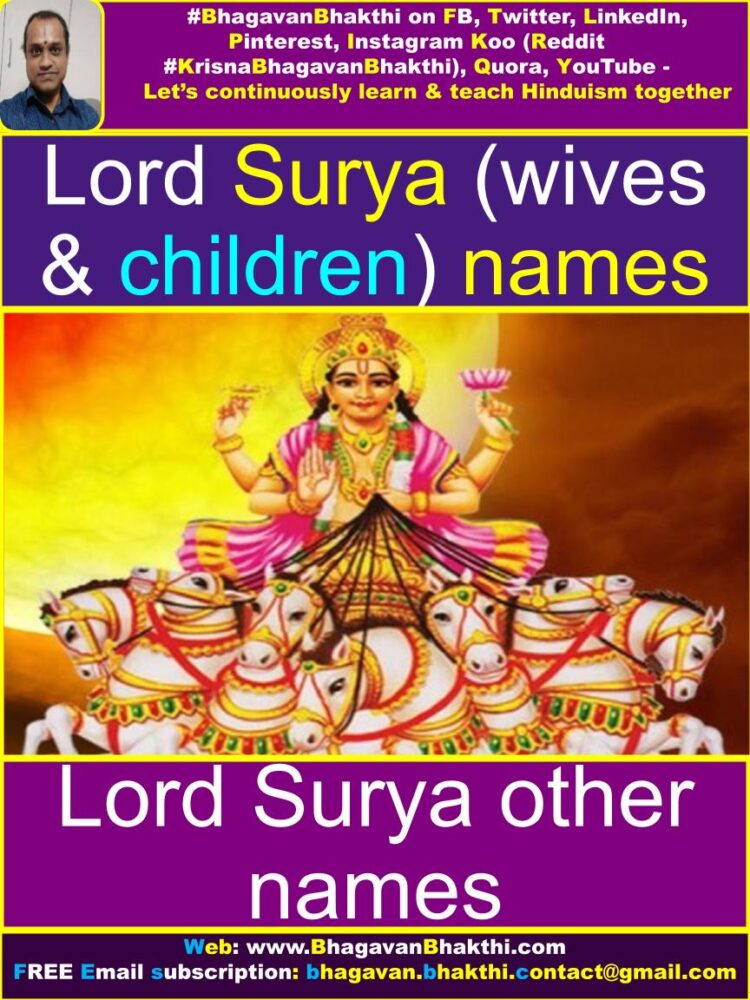
Apart from the names of the Dwadasha (twelve) Adityas, Lord Sri Surya Deva (The Sun God) has twelve other (unique) names as well as given below:
Aditya, Savita, Surya, Mihira, Arka, Prabhakara, Martanda, Bhaskara, Bhanu, Chitrabhanu, Divakara and Ravi.
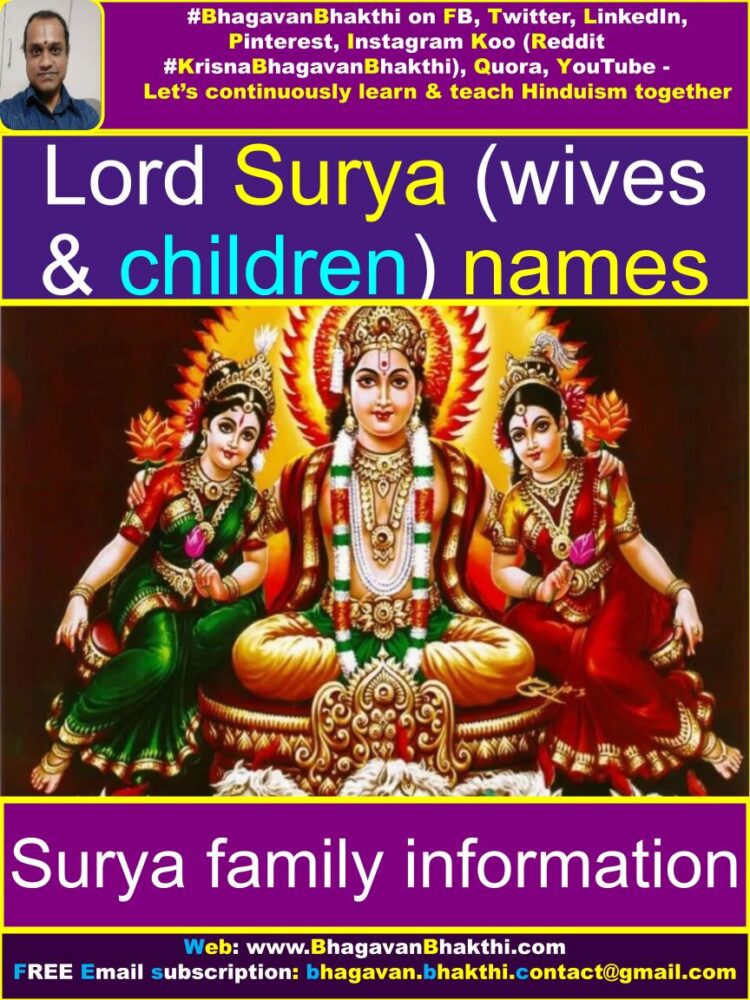
Lord Surya and his family information is as given below:
Lord Sri Surya Deva (The Sun God) was married to Sanjya or Samajna or Sharanya) and she is the daughter of the Vishwakarma.
[Vishwakarma is the Deva Shilpi, that is, he is the architect / engineer of the Devatas (Demigods).]
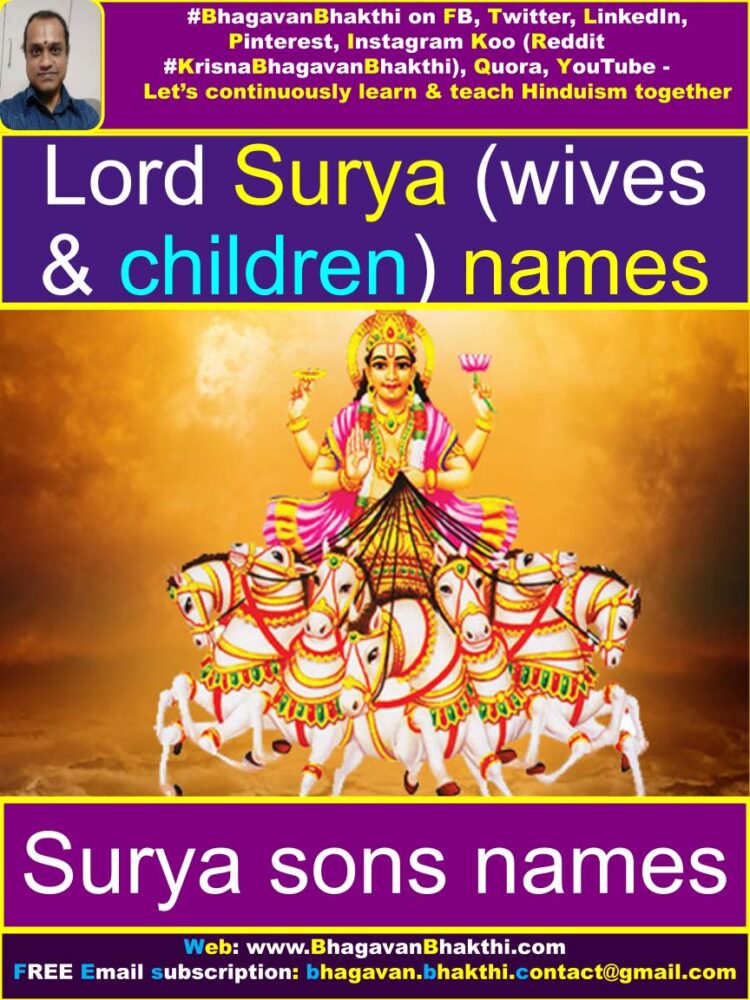
What are the names of Surya Putras (sons) (children)? : Lord Sri Surya Deva (The Sun God) and Sanjya had two sons. The first son was Vaivasvata Manu and the second son was Lord Sri Yama Deva (Also called as Shraddhadeva), the god of death.
And also Lord Sri Surya Deva (The Sun God) and Sanjya had daughter called Yami (Yamuna – The River). She is the twin sister of Lord Sri Yama Deva.
Lord Sri Surya Deva’s tejas (brightness) was so strong that Sanjya could not bear to look at her husband.
Through Sanjya’s powers, she created an image from her own body that looked exactly like her. This image was called Chhaya (shadow).
Sanjya told Chhaya, “I cannot bear the tejas (brightness) of my husband. I am going off to my father’s home“.
“You stay here, pretend to be Sanjya and look after my children. Under no circumstances tell anyone, certainly not my husband, that you are not Sanjya.”
“I will do as you have asked me to“, replied Chhaya. “But the moment someone curses me or pulls me by the hair, I shall be forced to reveal the truth” Chhaya added.
Sanjna went to her father Vishvakarma home and told him what she had done. Vishvakarma kept asking her to return to her husband. But this Sanjna refused to do all the time.
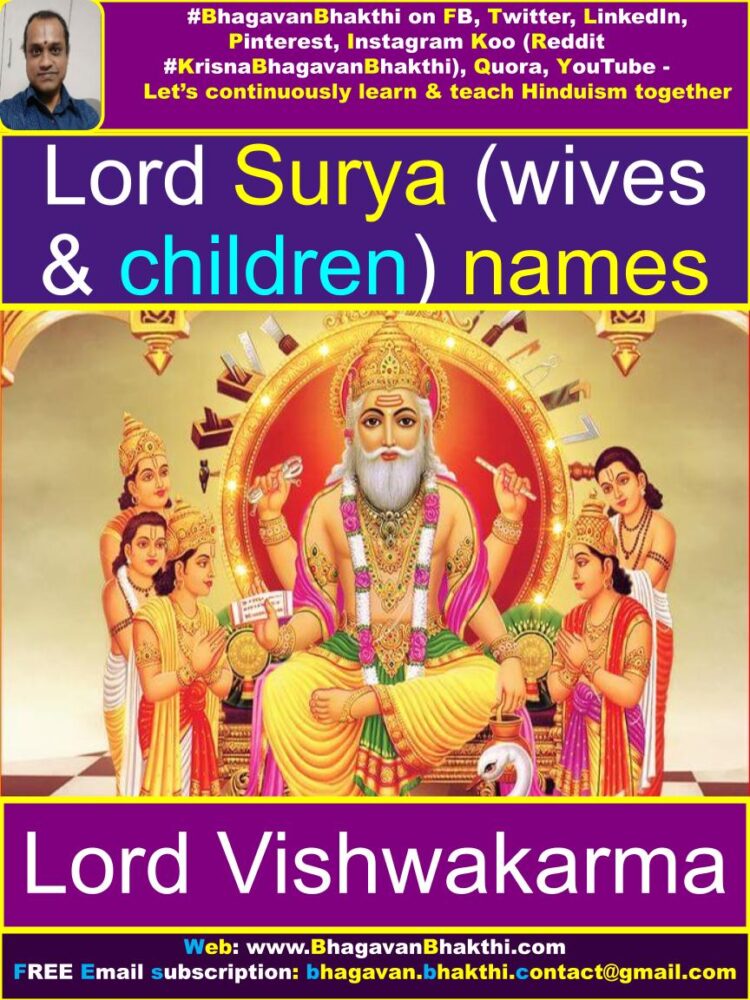
Instead, Sanjya went to the land known as ‘Uttara Kuru‘ and started to live there as a mare (adult female horse).
Meanwhile, Lord Sri Surya Deva (The Sun God), who had not realized that Sanjya had been replaced by Chhaya, had two sons through Chhaya.
Both Lord Sri Surya Deva (The Sun God) and Chhaya children names are ‘Savarni Manu‘ and Lord Sri Shani Deva (Planet Saturn).
As soon as her own children were born, Chhaya no longer displayed as much of love for Sanjya’s children as she used to do. Vaivasvata Manu was a quiet sort of person and he ignored the implied neglect.
But Lord Sri Yama Deva was not that tolerant. Besides, he was also younger. He raised his leg to kick Chhaya. At this, Chhaya cursed Lord Sri Yama Deva that his legs would fall off.
Lord Sri Yama Deva went and complained to Lord Sri Surya Deva (The Sun God). “I have not really kicked her“, Lord Sri Yama Deva said.
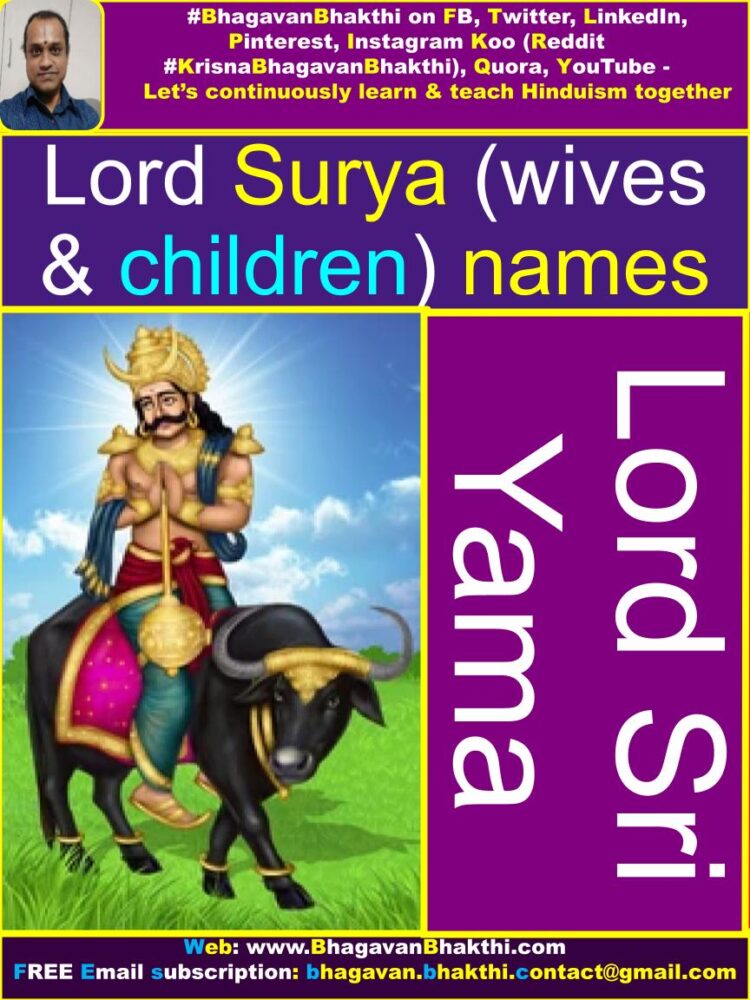
“I only threatened to. And does a mother ever curse her children?“, Lord Sri Yama Deva added.
“I can’t undo the curse“, replied Lord Sri Surya Deva (The Sun God). “At best, I can reduce its severity. Your legs will not actually fall off. Some of the flesh from your legs will fall off onto the earth and create worms. Thereby, you will be freed of your curse.“
But nevertheless, Lord Sri Surya Deva (The Sun God) felt that there was some truth in Lord Sri Yama Deva’s asking whether a mother would ever curse her children.
Lord Sri Surya Deva (The Sun God) taxed Chhaya with the truth. But Chhaya would not reveal anything.
Lord Sri Surya Deva (The Sun God) then grasped her by the hair and threatened to curse her. Since her conditions were now violated, Chhaya blurted out the truth.
In an extremely angry mood, Lord Sri Surya Deva (The Sun God) dashed off to Vishvakarma’s house. Vishvakarma tried to cool him down.
“It is all because of your excess energy that this has happened“, exclaimed Vishvakarma. “If you permit, I will shave off some of the extra energy. Then Sanjya will be able to look at you.“
Lord Sri Surya Deva (The Sun God) agreed to this proposition. With the shaved off energy, Vishvakarma manufactured Lord Sri Vishnu’s chakra called as “Sudarshana Chakra” (a weapon like a bladed discus).
Lord Sri Surya Deva (The Sun God) found out that Sanjya was in ‘Uttara Kuru’ in the form of mare (female horse). He joined her there in the form of a Stallion (male horse).

As horses, Lord Sri Surya Deva (The Sun God) and Sanjya had two sons namely ‘Nasatya and Dasra‘.
Since ashva means horse in Sanskrit, the sons were also known as the two Ashvini Kumaras (Kumars) and became the ‘physicians of the Devatas (Demigods)‘.
[Note : These same Nasatya and Dasra were born as Meinda and Dvivida during the Treta Yuga (Ramayana) period and served Lord Sri Rama in the army of monkeys.]
[Similarly both Nasatya and Dasra were again reborn as Nakula and Sahadeva during the Dwapara Yuga (Mahabharata) period and served Lord Sri Krishna as the brothers of Pandavas.]
Lord Sri Surya Deva (The Sun God) and Sanjya then gave up their equine forms and lived happily ever after.
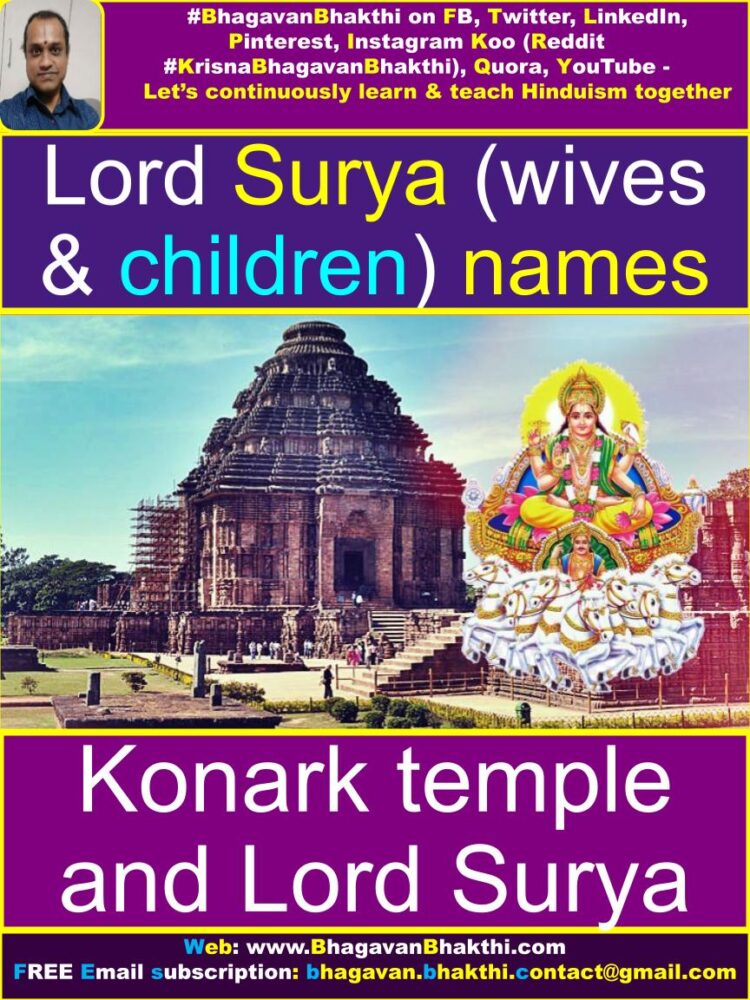
Information about the temple Konark (Konarka) in relation to Lord Surya (Sun God) is as given below:
There is a Mahasamudram (huge ocean) towards the south of India. On the shores of this great ocean, there is a land named Ondra or Utkala (present Odisha).
Utkala is populated by dharmatmas (people who follow Dharma) and the brahmanas (brahmins) who live there are learned in the Vedas.
They are very good brahmanas (bramins), learned in the Puranas and the Shastras (Hindu Texts) and skilled in the art of tyagams.
In the land of Utkala, there is an image of the Lord Sri Surya Deva (The Sun God) known as ‘Konaditya (कोनादित्य) (kōnāditya)‘ (read as Konaaditya).
The word Aditya also means the Sun, as does the word Arka (also means a tree – Calotropis gigantea).
Thus, Konaditya is the same as Konarka (Konark), a corruption of the latter word being Konaraka / Konarka / Konark. [Konaditya = Konarka = Konark = Kona + Arka (Ark)]
The image of Konaditya is so wonderful that even if one sees at the pratima (statue), that person’s sins will be forgiven.
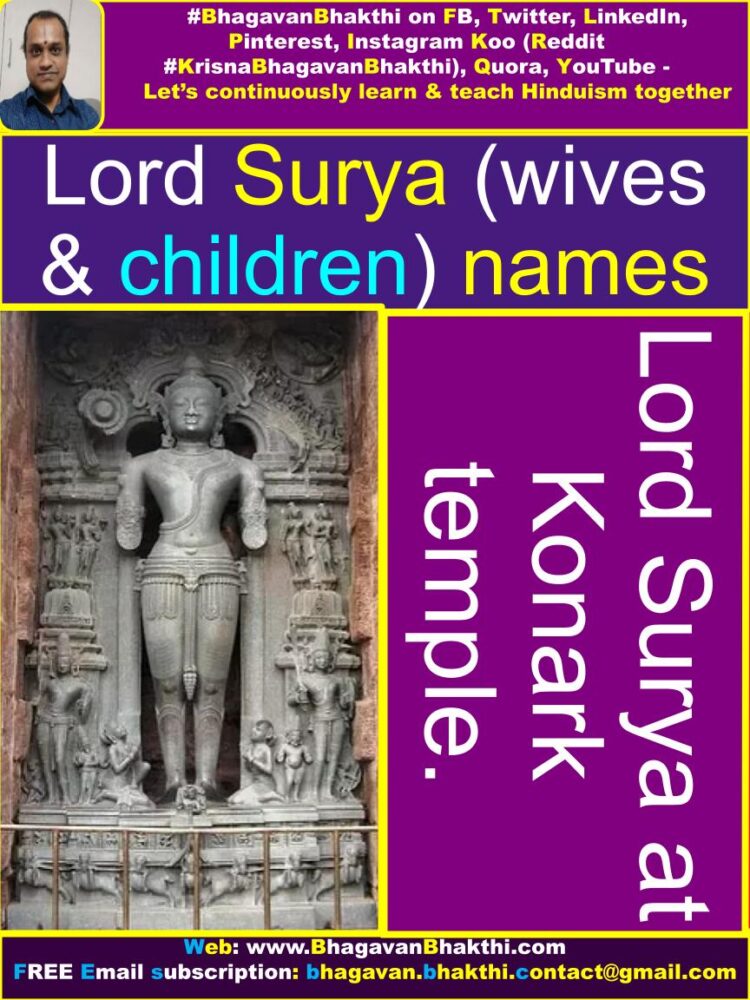
All around the temple there is sand. But nevertheless, many trees grow around the temple.
The best time to worship the Lord Sri Surya Deva (Surya Bhagavan) (The Sun God) there, is at the time of Suryodayam (Sunrise).
One has to face towards east and draw a lotus flower on the ground with red sandalwood. The lotus flower must have exactly eight petals.
A copper vessel has to be placed at the centre of the flower and filled with paddy, sesame, water, sandalwood, red flowers and sacred grass.
One prays to Lord Sri Surya Deva (The Sun God) to descend on the lotus flower that has thus been drawn.
If one worships Konaditya according to these prescribed rites, the sins of seven preceding generations are forgiven.
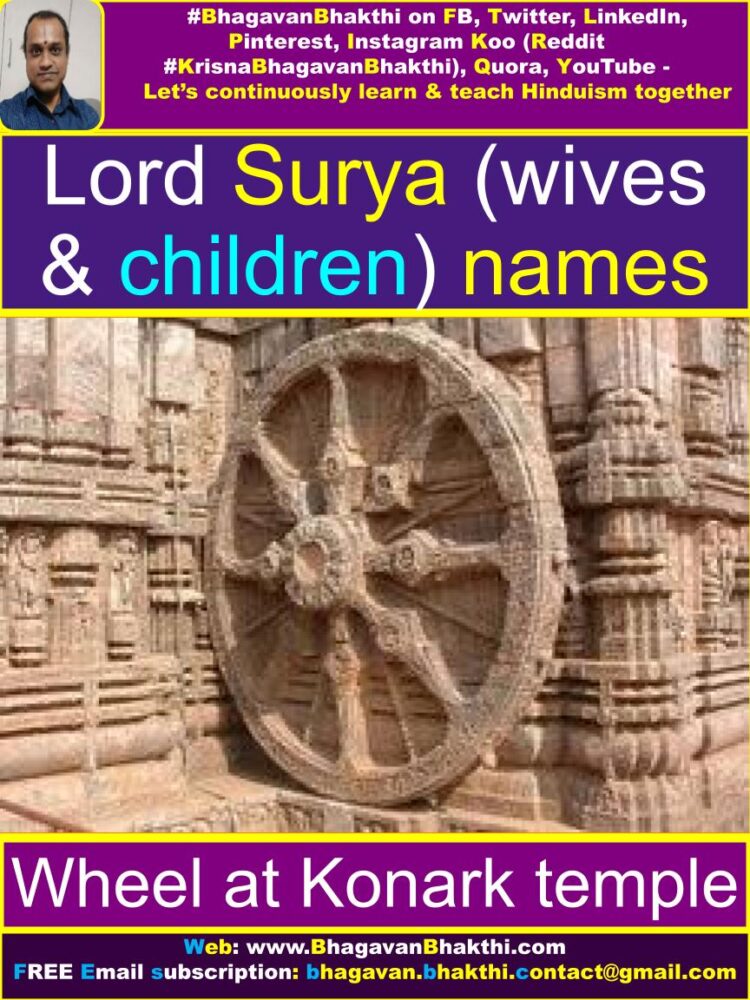
To know more about “Lord Sri Surya Deva & his family and also to know about the Lord Sri Surya Deva’s different auspicious names“, you can visit the below link:
Lord Sri Surya Deva information, facts, significance, importance
More information will be added to this on regular basis. Please visit this post (article) after some time to get updated information.
Continue reading about Hinduism (Sanatana Dharma) :
Lord Sri Srinivasa (Balaji full information)
Ramayana information, facts, significance, importance, etc.
Maharishi information, facts, importance, significance, etc.
Rivers information in Hinduism (Sanatana Dharma)
Hinduism (Sanatana Dharma) information, facts, etc.
Mahabharata information, facts, significance, importance etc.
To watch videos on #Hinduism #Sanskrit language, SUBSCRIBE to my YouTube channel from this below link:
#BhagavanBhakthi YouTube channel
Dear friends, if you need any clarifications about this post, kindly let me know, I will definitely try to answer all of them.
Also your one LIKE, one COMMENT, One Share, one SUBSCRIPTION is highly important.
This will help to know the quality of this content and also it will be helpful to know if any improvements is required for the content.
If you feel this content is useful to you and has helped you to improve your knowledge, kindly share this with your well-wishers.
Because “SHARING MEANS CARING”.
To receive FREE EMAIL SUBSCRIPTION about #BhagavanBhakthi, you can send an email to [email protected] from your email ID.
NAMASTE!
SRI GURUBHYO NAMAHA
OM NAMO NARAYANAYA
Sri Krishnaarpanamastu
Share in Social Media
ಸವಿತಾ ಮಹರ್ಷಿ ಸೂರ್ಯದೇವನ ಮಗ ಎನ್ನುತ್ತಾರೆ ನಿಜವೇ ತಿಳಿಸಿ ಮತ್ತು ತಾಯಿ ಹೆಸರನ್ನೂ ತಿಳಿಸಿ
ಸವಿತೃ ಎಂದರೆ ಶ್ರೀ ಸೂರ್ಯದೇವರ ಹೆಸರು. ನಿಮ್ಮ ಪ್ರಶ್ನೆಯ ಕುರಿತು ಯಾವುದೂ ಮಾಹಿತಿ ಇಲ್ಲ. ಮಾಹಿತಿ ಸಿಕ್ಕಿದರೆ, ತಿಳಿಸುತ್ತೇನೆ.
ಶುಭಮಸ್ತು!